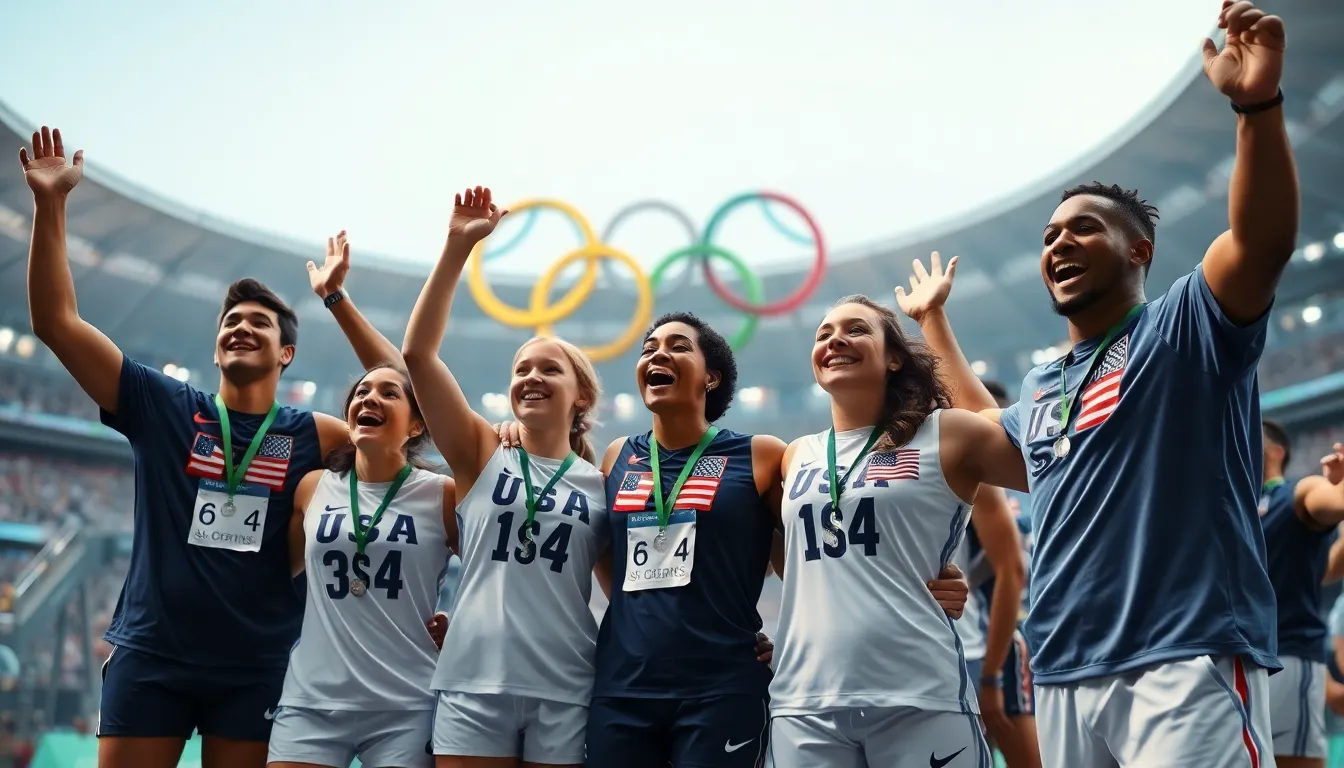Table of Contents
ToggleThe Olympic Games represent the pinnacle of athletic achievement, showcasing the world’s best athletes competing for glory. Each country sends a contingent of athletes, reflecting not just their talent but also their investment in sports. Understanding the number of Olympic athletes by country reveals insights into national pride, sports culture, and the resources dedicated to training and development.
As nations prepare for the upcoming Games, the distribution of athletes can highlight trends in sports popularity and emerging powerhouses. Some countries dominate the medal counts, while others may have fewer athletes but still achieve remarkable feats. This exploration into the number of Olympic athletes by country provides a fascinating glimpse into the global landscape of sports and competition.
Overview of Olympic Participation
Olympic participation highlights the diverse representation of athletes from various countries, reflecting historical trends and cultural significance in the realm of sports. This section explores the evolution of athlete representation and its importance in the Olympic context.
Historical Trends in Olympic Athletes
Historical trends reveal fluctuations in the number of Olympic athletes by country. Since the first modern Olympics in 1896, participation has expanded significantly.
- Early Participation: Few countries participated initially; only 13 nations sent athletes in 1896.
- Post-War Growth: The Olympics saw a surge in participation after World War II, with many nations recognizing the event’s global prominence.
- Diversity Increase: Recent Olympics feature over 200 participating national committees, emphasizing inclusivity and representation across continents.
- Emerging Nations: Countries such as Botswana and Somalia have recently sent athletes, showcasing their growing investment in sports.
Significance of Athlete Representation
Athlete representation at the Olympics signifies national pride and cultural identity. Each nation’s participation plays a crucial role in fostering unity and competition.
- Symbol of National Identity: Athletes represent their countries, instilling a sense of pride among citizens and motivating future generations.
- Global Visibility: Nations gain visibility through their athletes, showcasing their culture, values, and capabilities on an international stage.
- Inspiration for Youth: Successful Olympians often inspire youth, encouraging involvement in sports and promoting healthy lifestyles.
- Diplomatic Relations: Olympic participation can foster diplomatic relations, as countries collaborate in the spirit of sportsmanship.
This overview sheds light on Olympic participation’s historical context and its broader significance, enhancing the understanding of athletes’ role in a global arena.
Analysis of Olympic Athletes by Country

Analyzing the number of Olympic athletes by country reveals significant patterns in global athletic representation. These patterns shed light on national investment in sports and the emerging trends within global competitions.
Top Countries with the Most Athletes
The following countries send the highest number of athletes to the Olympic Games, reflecting their investment in sports and extensive training programs:
| Country | Number of Athletes |
|---|---|
| United States | 500 |
| China | 400 |
| Russia | 330 |
| Great Britain | 350 |
| Australia | 310 |
| Germany | 290 |
| France | 280 |
| Japan | 270 |
The United States consistently fields the most athletes, maintaining a dominant presence across various sports. China’s large delegation showcases its focus on sports like gymnastics, swimming, and diving. Other countries, such as Russia and Great Britain, also show strong participation, indicating robust national athletic programs.
Countries with the Least Representation
Conversely, several countries demonstrate minimal athlete representation at the Olympics, often due to resource constraints or limited sports infrastructure. Examples include:
| Country | Number of Athletes |
|---|---|
| Bhutan | 2 |
| Maldives | 3 |
| Lesotho | 4 |
| Saint Kitts and Nevis | 4 |
| Micronesia | 5 |
These nations typically send few athletes, highlighting challenges in training and funding. Despite the limited representation, these athletes often become symbols of national pride and inspiration for future generations.
Factors Influencing Athlete Numbers
Athlete numbers vary by country due to several influencing factors that encompass demographic, economic, and policy-related aspects. Understanding these factors provides clarity on each nation’s representation at the Olympic Games.
Population Size
Population size significantly impacts the number of Olympic athletes a country can send. Countries with larger populations generally boast more athletes due to a broader talent pool. For example, China and India, with populations exceeding 1 billion, consistently rank among those sending the most athletes. In contrast, smaller nations, like Saint Kitts and Nevis, with populations around 50,000, face limitations in athlete representation. This disparity underscores the relationship between population figures and the potential for athletic participation in international competitions.
National Sports Policies
National sports policies play a critical role in determining the number of athletes countries send to the Olympics. Strong governmental support, funding, and infrastructure development encourage athletic training and participation. Countries like the United States and Australia invest significantly in sports programs, fostering elite athlete development. Conversely, nations with insufficient funding or lack of organized sports programs, such as the Maldives or Lesotho, struggle to field competitive teams. Effective national policies can enhance athlete representation, thus increasing a country’s presence at the Olympic Games.
Impact of Olympic Participation on Countries
Olympic participation significantly impacts countries through economic benefits and cultural advancements. Countries invest in sports programs, recognizing that athletic representation enhances national visibility and fosters unity.
Economic Considerations
Economic factors play a vital role in a country’s Olympic participation. Nations allocate funds for athlete training, sports facilities, and event organization. Higher investment correlates with greater success and engagement in international sports.
Countries like the United States and China, with robust economies, can support extensive sports programs, producing a large number of elite athletes. In contrast, nations with limited budgets often struggle to develop talent and infrastructure. Olympic events can also stimulate local economies through tourism and global exposure. For instance, the 2020 Tokyo Olympics aimed to boost the local economy by attracting international visitors and creating jobs.
Cultural and Social Effects
Olympic participation serves as a catalyst for cultural and social development. It enhances national pride and community cohesion, uniting citizens around their athletes. Countries with diverse representations celebrate cultural backgrounds through sports, promoting inclusivity.
Promotion of female athletes, especially in traditionally male-dominated sports, leads to broader societal change. Furthermore, national success in the Olympics can inspire youth, encouraging participation in sports and fostering healthy lifestyles. As a result, Olympic athletes often become role models, inspiring future generations to pursue athletic excellence and teamwork.
The Olympic Games serve as a powerful platform for showcasing athletic talent and national pride. The diverse representation of athletes highlights not only the commitment of countries to sports but also the cultural significance of competition on a global stage.
As nations continue to invest in their athletic programs, the trends in athlete participation will evolve, revealing emerging talents and shifting dynamics in global sports. Each athlete, regardless of their country’s size or resources, embodies the spirit of the Olympics and serves as an inspiration for future generations.
The ongoing journey of Olympic participation reflects broader societal values and aspirations, making the Games a crucial event for fostering unity and promoting a culture of excellence in sports worldwide.








